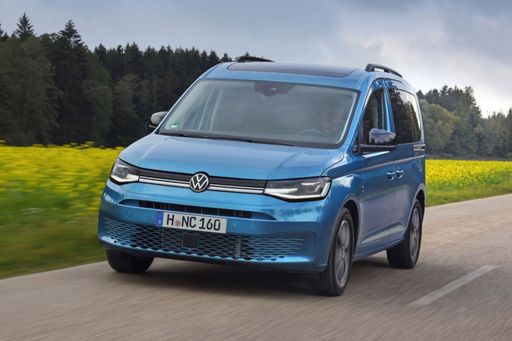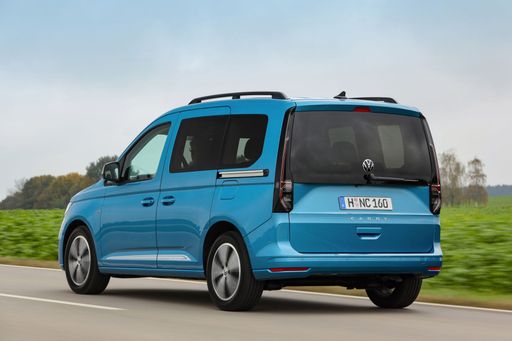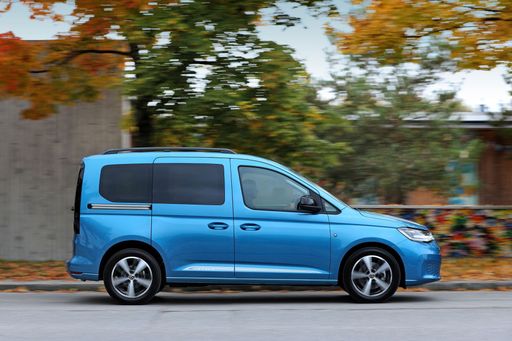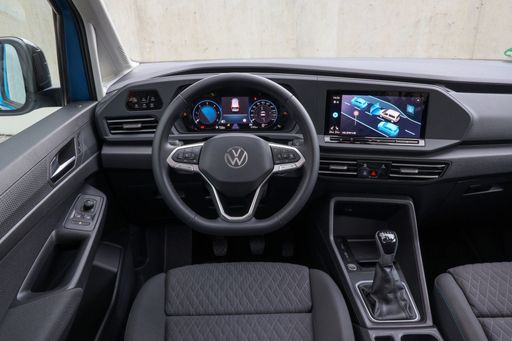In the competitive world of compact vans, the Ford Transit Connect and VW Caddy have emerged as formidable contenders, each boasting a blend of functionality, performance, and modern technology. As both brands continue to innovate in 2024, we take a closer look at how these two popular models compare in terms of technical specifications, innovations, and practical applications.
Ford Transit Connect vs VW Caddy - Differences and prices compared
Compare performance (150 HP vs 150 HP), boot space and price (26700 £ vs 27800 £ ) at a glance. Find out which car is the better choice for you – Ford Transit Connect or VW Caddy?
Body and Dimensions
The Ford Transit Connect is designed primarily as a cargo van, measuring between 4500 and 4868 mm in length, 1855 mm in width, and standing at 1860 mm tall. Its cargo capacity is impressive, making it a robust choice for small business owners.
Alternatively, the VW Caddy presents itself as a high roof wagon, sharing a similar width at 1855 mm but offering a more spacious cabin with a height ranging from 1819 to 1860 mm. The Caddy also measures 4500 mm in length, providing ample passenger and cargo space.
Powertrains and Performance
When it comes to engines, the Ford Transit Connect offers a choice between diesel and plug-in hybrid options, with power outputs ranging from 102 to 150 HP. It features a front-wheel-drive system coupled with a manual or dual-clutch automatic transmission, making it versatile for various driving conditions.
Conversely, the VW Caddy provides both petrol and diesel engine configurations, as well as a plug-in hybrid variant. Power ratings for the Caddy also span from 102 to 150 HP, and this model offers both front-wheel and all-wheel drive, giving it an edge in traction under challenging conditions.
Acceleration and Top Speed
The Transit Connect demonstrates commendable acceleration capabilities, with a 0-100 km/h time as quick as 11.4 seconds and a top speed of 175 km/h. This performance is enabled by its efficient engine choices and lightweight design, making it suitable for urban and highway use alike.
In comparison, the VW Caddy boasts a slightly improved acceleration time of 11.4 seconds and a higher top speed reaching up to 182 km/h. Such performance can appeal to those who prioritize a dynamic driving experience.
Fuel Efficiency and Battery Range
Fuel economy is a crucial factor for commercial vehicles, and both models deliver competitive figures. The Ford Transit Connect showcases a fuel tank capacity of 50 liters, allowing it to maintain distances between refuels effectively.
On the other hand, the VW Caddy’s fuel consumption ranges from 5.3 to 6.9 L/100 km across its different engine options, coupled with a comparable tank size. Furthermore, the Caddy's plug-in hybrid variant comes equipped with a 19.7 kWh battery, providing an electric range of up to 121 km—perfect for short urban commutes.
Interior and Comfort Features
Inside the Ford Transit Connect, drivers will find an ergonomic design focused on practicality. With options for two or five seats, the van emphasizes cargo space, but it also includes modern technology to enhance the driving experience.
The VW Caddy takes the interior experience a step further. With seating for up to seven and a more dynamic layout, it focuses on comfort and functionality. The Caddy is equipped with advanced connectivity options, enhancing user interaction with smart devices and navigation systems.
Conclusion: Which One Reigns Supreme?
Both the Ford Transit Connect and VW Caddy showcase their unique strengths—while the Transit Connect excels in versatility and practical cargo handling, the Caddy impresses with its advanced technology and overall driving comfort. Ultimately, the choice between these two compact vans may come down to personal preferences, intended usage, and brand loyalty.
As businesses continue to evolve in their logistics and mobility needs, both models are likely to remain integral players in the commercial vehicle market for years to come.
Here’s where it gets real: The technical differences in detail
Costs and Efficiency:
Price and efficiency are often the first things buyers look at. Here it becomes clear which model has the long-term edge – whether at the pump, the plug, or in purchase price.
Ford Transit Connect has a hardly perceptible advantage in terms of price – it starts at 26700 £ , while the VW Caddy costs 27800 £ . That’s a price difference of around 1035 £.
Both cars consume an average of 0.50 L per 100 km – no difference here.
As for electric range, the VW Caddy performs hardly perceptible better – achieving up to 121 km, about 3 km more than the Ford Transit Connect.
Engine and Performance:
Power, torque and acceleration say a lot about how a car feels on the road. This is where you see which model delivers more driving dynamics.
Both models deliver identical power – 150 HP each.
Both models accelerate almost equally fast – 11.40 s from 0 to 100 km/h.
There’s no difference in top speed – both reach 186 km/h.
There’s also a difference in torque: Ford Transit Connect pulls barely noticeable stronger with 350 Nm compared to 320 Nm. That’s about 30 Nm difference.
Space and Everyday Use:
Beyond pure performance, interior space and usability matter most in daily life. This is where you see which car is more practical and versatile.
Seats: VW Caddy offers evident more seating capacity – 7 vs 5.
In curb weight, Ford Transit Connect is hardly perceptible lighter – 1477 kg compared to 1575 kg. The difference is around 98 kg.
Maximum load volume is the same – both hold up to 3700 L.
When it comes to payload, Ford Transit Connect somewhat takes the win – 792 kg compared to 710 kg. That’s a difference of about 82 kg.
Who wins the race in the data check?
The VW Caddy sits just ahead overall in the objective data comparison.
This result only shows which model scores more points on paper – not which of the two cars feels right for you.
Costs and Consumption
View detailed analysis
Engine and Performance
View detailed analysis
Dimensions and Body
View detailed analysis

VW Caddy
Ford Transit Connect
The Ford Transit Connect is the go-to compact workhorse for urban professionals who need cargo space without driving a full-size van. It balances practicality and everyday manners with clever storage ideas and a surprisingly comfortable ride, making it a sensible choice for small businesses and families who value function over flair.
details


VW Caddy
The VW Caddy is the Swiss-army knife of compact vans — practical, surprisingly refined, and ready to swap a weekend adventure for a grocery run without breaking a sweat. It’s user-friendly, comfortable enough for daily driving, and sensible for buyers who want utility with a dash of style and no drama.
details



Costs and Consumption |
|
|---|---|
|
Price
26700 - 41500 £
|
Price
27800 - 45900 £
|
|
Consumption L/100km
0.5 - 5.8 L
|
Consumption L/100km
0.5 - 6.9 L
|
|
Consumption kWh/100km
-
|
Consumption kWh/100km
-
|
|
Electric Range
118 km
|
Electric Range
116 - 121 km
|
|
Battery Capacity
19.70 kWh
|
Battery Capacity
19.70 kWh
|
|
co2
11 - 153 g/km
|
co2
10 - 165 g/km
|
|
Fuel tank capacity
32 - 50 L
|
Fuel tank capacity
50 L
|
Dimensions and Body |
|
|---|---|
|
Body Type
Cargo Van
|
Body Type
High Roof Estate
|
|
Seats
2 - 5
|
Seats
5 - 7
|
|
Doors
4
|
Doors
5
|
|
Curb weight
1477 - 1866 kg
|
Curb weight
1575 - 1998 kg
|
|
Trunk capacity
-
|
Trunk capacity
-
|
|
Length
4500 - 4868 mm
|
Length
4500 - 4853 mm
|
|
Width
1855 mm
|
Width
1855 mm
|
|
Height
1856 - 1860 mm
|
Height
1819 - 1860 mm
|
|
Max trunk capacity
2500 - 3700 L
|
Max trunk capacity
2556 - 3700 L
|
|
Payload
602 - 792 kg
|
Payload
501 - 710 kg
|
Engine and Performance |
|
|---|---|
|
Engine Type
Diesel, Plugin Hybrid
|
Engine Type
Petrol, Diesel, Plugin Hybrid
|
|
Transmission
Manuel, Automatic
|
Transmission
Manuel, Automatic
|
|
Transmission Detail
Manual Gearbox, Dual-Clutch Automatic
|
Transmission Detail
Manual Gearbox, Dual-Clutch Automatic
|
|
Drive Type
Front-Wheel Drive, All-Wheel Drive
|
Drive Type
Front-Wheel Drive, All-Wheel Drive
|
|
Power HP
102 - 150 HP
|
Power HP
102 - 150 HP
|
|
Acceleration 0-100km/h
11.4 - 13.5 s
|
Acceleration 0-100km/h
11.4 - 14 s
|
|
Max Speed
175 - 186 km/h
|
Max Speed
173 - 186 km/h
|
|
Torque
280 - 350 Nm
|
Torque
220 - 320 Nm
|
|
Number of Cylinders
4
|
Number of Cylinders
4
|
|
Power kW
75 - 110 kW
|
Power kW
75 - 110 kW
|
|
Engine capacity
1498 - 1968 cm3
|
Engine capacity
1498 - 1968 cm3
|
General |
|
|---|---|
|
Model Year
2024 - 2025
|
Model Year
2024
|
|
CO2 Efficiency Class
E, B
|
CO2 Efficiency Class
E, F, B
|
|
Brand
Ford
|
Brand
VW
|
What drive types are available for the Ford Transit Connect?
The Ford Transit Connect is available as Front-Wheel Drive or All-Wheel Drive.
